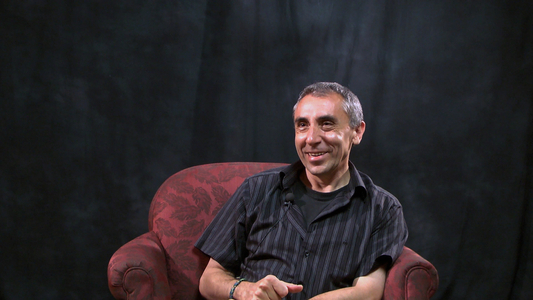Hanan Bordin
Item Information
- Title:
- Hanan Bordin
- Description:
-
Hanan Bordin, the Yiddish language instructor at Hebrew University in Jerusalem and the author of several Yiddish textbooks, was interviewed by Marcy Blattner on July 13, 2010 at the Yiddish Book Center in Amherst, Massachusetts. This interview is entirely in Yiddish. Hanan Bordin was born in Riga, Latvia, in the former Soviet Union. Hanan states that he heard Yiddish as a child, but did not speak it. When he arrived in Israel in 1978, he had a vocabulary of about one hundred words in Yiddish. Hanan studied mathematics in Riga, but when he came to Israel he decided to study linguistics. He enrolled at the Hebrew University in Jerusalem and exerted great efforts to master both Hebrew and Yiddish. After his army service, Hanan decided to specialize in Yiddish, even though he had been offered work in the Hebrew Department. Hanan also speaks about the teachers in the Yiddish Department at the time of his studies, and about the department in general. Hanan states that the Yiddish department at the Hebrew University was a very strong, independent department, with important teachers and publications. Hanan, asked about his connection to Jewish tradition, describes his grandmother's influence in this part of his life. She prayed, went to synagogue, kept Shabbat, and cooked Jewish dishes. Hanan recalls his early years as a teacher in an experimental school for girls in Jerusalem, where he taught Yiddish but did not speak it. He knew that he had to overcome this barrier, and was helped immensely by Vera Solomon, one of the teachers at the time in the Yiddish department. She was adamant about speaking only in Yiddish, and Hanan is thankful to her for his breakthrough. She also collaborated with him on his first book, in Yiddish and Hebrew, called Yidish shmuesbikhl (“Yiddish Conversation Book”). Hanan later wrote another version of this for Russian speakers, ordered by the Jewish Agency, for study in the Soviet Union. Hanan wrote another two books: one for beginners in Yiddish, which is used at the Hebrew University, and one for advanced Yiddish learners, but it was never published. Hanan enumerates the places where he has taught: he teaches full time at the Hebrew University, where he has several Yiddish classes at different levels, and a Yiddish linguistics class, taught entirely in Yiddish. Hanan has also taught courses at Columbia University, Oxford University, Harvard University, YIVO classes at New York University, courses in Moscow and Birobidzhan, Russia, in Vilna (Vilnius), Lithuania, and at the Yiddish Book Center in Amherst, Massachusetts. In discussing his relatives in Israel, Hanan relates a story about his grandmother's nephew, Mula, who had fought in the Russian army in World War II. They thought that he had been killed for desertion and Hanan's grandmother said kaddish (the mourner's prayer) for him every year. In the late 1970s, they began to hear rumors that he was alive in Israel. When Jews from Riga began to immigrate to Israel, Hanan asked some friends of his to try to locate him. Hanan's friends located Mula in the Israeli city of Rehovot, and helped him call the family in Riga. A year later, in 1978, Hanan, his mother, and his grandmother immigrated to Israel and were met at the airport by Mula and his family, and the two friends from Riga. Hanan speaks about his attachment to Vilna, He loves to teach there, and recommends going there to anyone learning Yiddish. In general, his advice to people learning Yiddish is to speak it as much as possible. He fears that if no one speaks Yiddish in an educated manner, reflecting the Yiddish culture of pre-war Vilna, there will be no one left to preserve the “civilization” of Eastern Europe. Yiddish will be a classical language, like Greek and Latin, studied but not “felt.” To cite this interview: Hanan Bordin Oral History Interview, interviewed by Marcy Blattner, Yiddish Book Center's Wexler Oral History Project, Karmazin Recording Studio, Yiddish Book Center, July 13, 2010. Video recording, http://archive.org/details/HananBordin13july2010YiddishBookCenter ( [date accessed] )
- Date:
-
July 13, 2010
- Format:
-
Film/Video
- Location:
- Yiddish Book Center
- Collection (local):
-
Oral Histories
- Subjects:
-
Yiddish language interview
Yiddish
Yiddish education
Yiddish Book Center
Wexler Oral History Project
Advice
Family history
Stories about ancestors
Jewish Identity
Yiddish language
Yiddish teaching
Yiddish learning
Immigration
Migration
Hebrew
Books
Career and Professional Life
World War Two
Education
Religion and ritual
Synagogue
Shul
Temple
Family traditions
Rosh Hashanah
Yom Kippor
Yom Kippur
Pesakh
Passover
Shabbat
Shabbes
Sabbath
Israel
Soviet Union
Russia
Food and culinary traditions
Yiddish revival and activism
Coming back to Yiddish
Yiddish speaker
Other languages
Scholarship
Academia
Jewish education
Eastern Europe
America
United States
Transmission
Roots/heritage
Riga
Latvia
Galicia
Poland
Ukraine
Vilne
Vilna
Vilnius
Lithuania
Moscow
Birobidzhan
Jerusalem
Amherst
Massachusetts
Vera Solomon
Hebrew University
Jewish Agency
Columbia University
Oxford University
Harvard University
YIVO
YIVO Institute for Jewish Research
New York University
1940s
1970s
1980s
1990s
2000s
2010s
- Link to Item:
- https://www.yiddishbookcenter.org/collections/oral-histories/interviews/woh-fi-0000047
- Terms of Use:
-
Rights status not evaluated.
Contact host institution for more information.
- Language:
-
Yiddish




